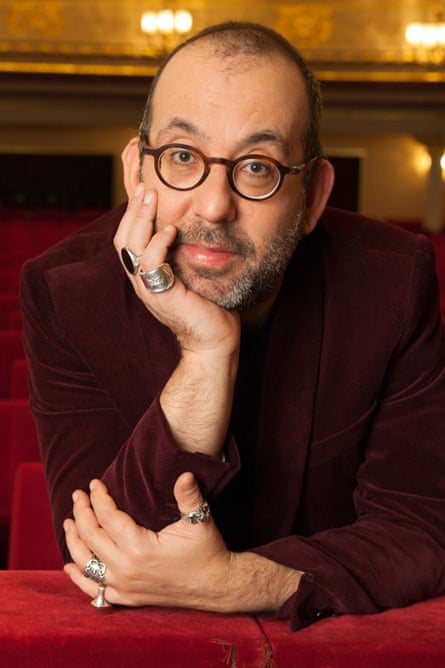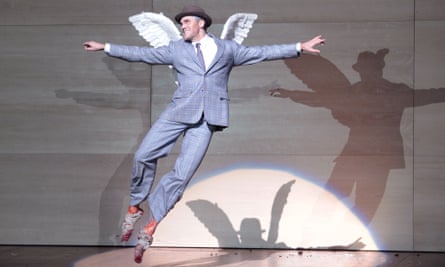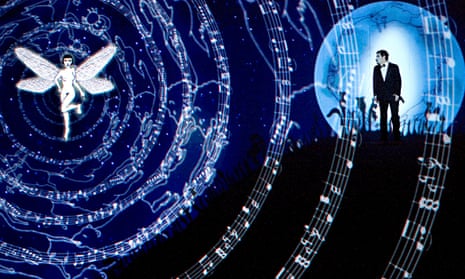‘There is no crisis in opera!” says Barrie Kosky. “It’s simple. Just give the British companies £100m – it’s as easy as that!” The Australian opera director is on passionate, trenchant form. He has two shows in the UK this summer: a new production of Handel’s Saul for his debut at Glyndebourne this month, and his globe-conquering production of Mozart’s The Magic Flute, which comes to the Edinburgh festival next month.
A nearly unstoppable tumult of ideas, energy and opinion, Kosky is as charismatic and inspirational in person as his productions are intense and thrilling. Opera in cinemas? “Cinemas and live streaming aren’t the future of opera. They’re just marketing tools. The future of opera is not getting people 12,000 miles away to see Anna Netrebko. That’s the death of opera.” The problem with British ideas of music-theatre? “There is an obsession with literalism and a fear of abstraction.” Doing a production in the middle of the sheep and somnolence of the Sussex downs at Glyndebourne? “They’re not getting Barrie-lite. I said to them, ‘I would love to come, but you’re not getting a Barrie summer production.’”
Apart from an Edinburgh festival appearance of his double bill of Purcell’s Dido and Aeneas and Bartók’s Bluebeard’s Castle, British audiences have had only one chance to see a Kosky show in repertoire so far: his production of Rameau’s Castor and Pollux for English National Opera in 2011, a rare foray for ENO into French baroque repertoire. But this was no gentle historical recreation: instead, his Castor and Pollux was a show that shocked some and delighted others with its probing psychosexual interpretation of Pollux’s descent into the Underworld. But that association of “Barrie Kosky” and “controversy” is a one-dimensional interpretation of what Kosky has been doing for the past 25 years on the stage in Australia, Vienna, and at the Komische Oper in Berlin, where he has been in charge since 2012. “What is a ‘Barrie Kosky’ show anyway?” he challenges me. “They all have very different styles. I pride myself on the fact that every single one of my shows has a different creative world.”
Indeed: there’s no bigger contrast between what Kosky did for Rameau and his Magic Flute, which is a joyous yet profound staging in which animation takes centre stage. Partly a homage to silent movies of the 1920s, Kosky’s Flute takes live video to new heights on the opera stage, with the singing characters seamlessly interacting with cartoons. But the roots of this show lie in his problematic relationship with the piece. When he first saw it as a child in Melbourne, he was bored. “I started going to the opera when I was seven, and my Hungarian grandmother put me on to Bartók and Janáček, so I had seen lots of opera when, a few years later, I saw my first Flute. And I was like, ‘Eughh?’” He makes a sound somewhere between incomprehension and nausea.

“It didn’t help that it was a terrible production that used Aussie vernacular for the dialogue. ‘Got a glass of red ned?’ I remember that line. I didn’t like the piece and didn’t understand it. I was offered the chance to do the Flute three times, and always said no, then the Komische Oper said we need a new production and I said, ‘I’m not doing it – it’s a graveyard for directors.’”
But the Flute is a siren song that no opera company chief can resist for long, so Kosky had no choice but to relent. It wasn’t easy for him. The problem is to do with what The Magic Flute actually is. For Kosky, it’s not an opera. “If you sat in the first season of the Flute in Vienna in 1791, you’d have realised that it’s end-of-the-pier meets panto meets Mozart’s profound music meets vaudeville. It’s structured like a revue, and it’s got nothing to do with Così fan tutte or Don Giovanni or the Da Ponte operas. The piece exists only half through Mozart’s music, the rest is Schikaneder’s words and his theatre. And that’s what’s genius about it. That’s why if you do a ‘concept’ production, it’s a catastrophe. It’s best to treat it like a surreal fairy story and let the deeper resonances just wander through.” Kosky’s epiphany about the piece led him to his collaborators: the animation and production team of London-based company 1927. “It was instant love: I knew the piece very well and they didn’t know it at all. They’d never even been to the opera. It was a perfect marriage.”
The result is a show that Kosky thinks is closer to what Mozart and Schikaneder intended “than most of the other productions I’ve seen”. What were scenic spectaculars in Schikaneder’s theatre become live animations in Kosky’s, so that the Queen of the Night is turned into a ferocious maternal spider that Louise Bourgeois would have been proud of. And that’s not all: at the start of the show, Tamino flees from the horrifying maw of a gigantic monster; and, whenever he thinks of Pamina, cartoon hearts explode with palpitating love. All of these things happen precisely in time with the music, too. If this is a show that returns to the spirit of the original, it’s also rooted in 21st-century technology.
Which is another world compared to what Kosky plans for Handel’s Saul at Glyndebourne. He is bracing himself for the criticism that, because Saul is an oratorio, it wasn’t meant to be staged. “There are no rules about what should be staged. If you’re surprised and delighted by what a director comes up with, you should celebrate it, whatever it is.” He wanted to do Saul because of its fantastic characters and its strong narrative: he finds the oratorios more radical in their structure and prefers their music to that of Handel’s operas.

“Handel’s biblical oratorios have absolutely nothing to do with the Jews or Jewish culture. So prayer shawls, suitcases, any reference to the Holocaust, or long-suffering ghetto images – they are all out. In fact, Saul is about as Goyish as you can get. There’s not a drop of Jewish feeling in it at all. For Handel, Saul is a king, he’s not a Jewish king, it’s got nothing to do with Jewish iconography at all.”
There are other cliches Kosky wants to avoid: “Mobile phones and press conferences are a problem in Handel productions at the moment. Peter Sellars did it brilliantly 30 years ago, but now it’s been done and done. I’m not interested in that any more. The show will have an archaic, epic, poetic quality. And it will be highly emotional, highly physical. I’ve been talking to the singers, and some I’ve worked with already know they are going to be bruised and battered. I saw Iestyn Davies [who sings David] the other day and said, ‘Are you preparing yourself? Grow your beard and get ready for a lot of tongue-kissing.’”
Kosky knows that he’s in a privileged position in Berlin, where 87% of the Komische Oper’s funding comes direct from the city, meaning he can take risks with repertoire, and with his productions (in three consecutive nights at the Komische Oper when I was there, they presented the Flute, and Kosky’s productions of Schoenberg’s Moses und Aron and Bernstein’s West Side Story, thereby traversing pretty well the entire operatic gamut in 72 hours), and he can keep ticket prices low. It all works: his average box office is 95% in Berlin. He pities the plight of the UK’s bigger opera houses. “Just give people more money to be able to experiment and to do their jobs and it’s the end of the discussion. The only solution is: if you want to do opera, do it well.”
Which all comes down to Kosky’s operatic credo. “In opera, people are experiencing – on an incredibly unconscious level – a return to an archaic form of storytelling ritual that we need. That’s why it will survive. It is a special thing and it’s a live experience: the human voice coming out of the human body that you can only hear in this space at this time. Opera is something that says more about our mortality and our emotions than most other things. I know that’s why I go. And I presume that I’m like millions of other people. So I remain blissfully optimistic about the future.”
Handel’s Saul is at Glyndebourne, 23 July to 29 August (box office: 01273 815 000). The Magic Flute is at Edinburgh, 27-30 August (box office: 0131-473 2000).

Comments (…)
Sign in or create your Guardian account to join the discussion